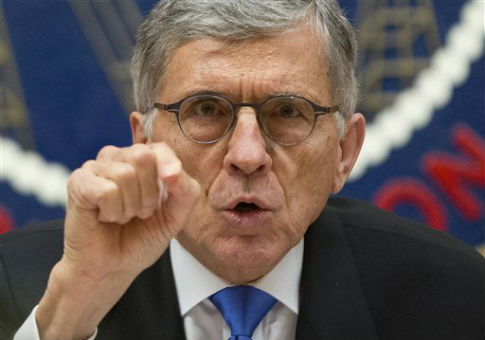The Federal Communications Commission voted on Thursday in favor of a proposal that will expand its influence over the Internet, but lawsuits from major Internet service providers (ISPs) as well as several congressional investigations mean the fight over Internet regulation is far from over.
In a 3-2 vote on Thursday, the FCC passed a proposal, the details of which have not been disclosed, to regulate Internet providers under Title II of the Communications Act of 1934, which was developed for telephone networks during the Great Depression.
"The regulation and litigation uncertainty caused by the FCC’s action will inhibit investment in new networks but also end up harming many of the companies pushing for Title II," said Robert McDowell senior fellow at the Hudson Institute, a conservative think thank, in a phone interview on Wednesday.
"Title II is a very powerful law, and it can’t be so easily shaped and narrowed as the proponents are advertising," said McDowell, a former FCC commissioner.
Major ISPs, such as AT&T and Verizon, are expected to sue the agency over the rules.
Francis Shammo, Verizon’s chief financial officer, told a New York audience in December 2014 that if the FCC chose to regulate broadband providers under Title II that she thought it would be a "litigious environment."
Jim Cicconi, AT&T’s senior executive vice president for external and legislative affairs, said in November 2014 that should the FCC enact Title II, the ISP "would expect to participate in a legal challenge to such action."
The public has to wait until the order is published in the Federal Register before it can see the rules. Publication is expected to take days or even weeks.
The FCC has promised to restrain itself from using the full authority granted to it by Congress under Title II, and supporters of the chairman’s plan, despite not having seen the rules themselves, have towed the government line.
In addition to lawsuit challenges to the FCC rules, three separate congressional investigations are also underway into attempts by the White House to influence the decision making of Thomas Wheeler, the FCC’s chairman.
"This chairman is not a lapdog for the president. He’s acting independently and he’s acting based on an evolution over a year proceeding," said Gigi Sohn, Wheeler’s special counsel for external affairs, during a radio interview.
Sohn’s remarks came just several days before the original Feb. 20 due date Rep. Jason Chaffetz (R., Utah), the head of the House Oversight & Government Reform Committee, gave Wheeler’s office to deliver documents to his committee for one of the three investigations.
Wheeler’s office missed the both the original deadline and the extended deadline. An FCC official said on Monday that Wheeler’s office asked for more time due to the size of Chaffetz’s request.
Chaffetz’s office did not respond to a request for comment.
Republicans in the House Energy and Commerce Committee and the Senate Committee on Homeland Security and Governmental Affairs have also launched investigations into the agency.
Wheeler earned a rebuke Wednesday from both Chaffetz and Rep. Fred Upton (R., Mich.), chairman of the House Energy and Commerce Committee, after declining a request to testify before Congress on his net neutrality proposal.
"After hearing from over four million Americans on such an important topic to our economic and cultural future, it’s striking that when Congress seeks transparency, Chairman Wheeler opts against it," said Upton and Chaffetz.
Ajit Pai, one of the FCC’s five commissioners, said during a press conference on Feb. 10 that not only did he finish reading all 332 pages of what he characterizes as "President Obama’s Internet regulation plan," but that it was "worse" than he imagined.
"The American people are being misled about President Obama’s plan to regulate the Internet," said Pai.
Wheeler and his office launched a public relations offensive during the first week of February to promote the benefits of his proposal, criticizing attempts to label the rules as utility-style regulations.
The chairman published an op-ed at Wired.com and a "fact sheet" on the FCC website as a rebuttal to his critics.
During a media conference call that same week, senior FCC officials unwilling to allow their names to be attributed to any statements made said that the rules would not regulate rates like a public-utility.
Commissioner Pai said that the plan does give the agency that authority, releasing his own "fact sheet" to counter Wheeler’s.
Pai said that he had no plans to leak the chairman’s order to the public out of respect for the FCC’s rules.
Advocates in favor of the new plan have defended Wheeler’s decision to withhold the document from the public. Free Press and New America Foundation’s Open Technology Institute, both influential pro-net neutrality organizations, rejected Pai’s claims as "misleading."
The Technology Policy Institute published a study on Feb. 9, which found that the FCC almost always published its orders "immediately following the vote" until the early 1970.
